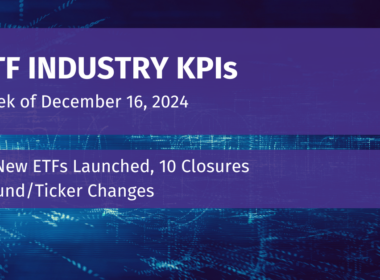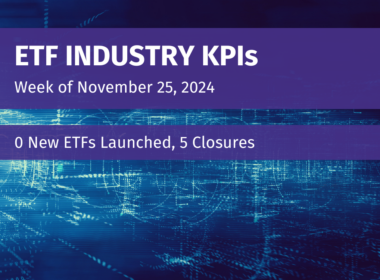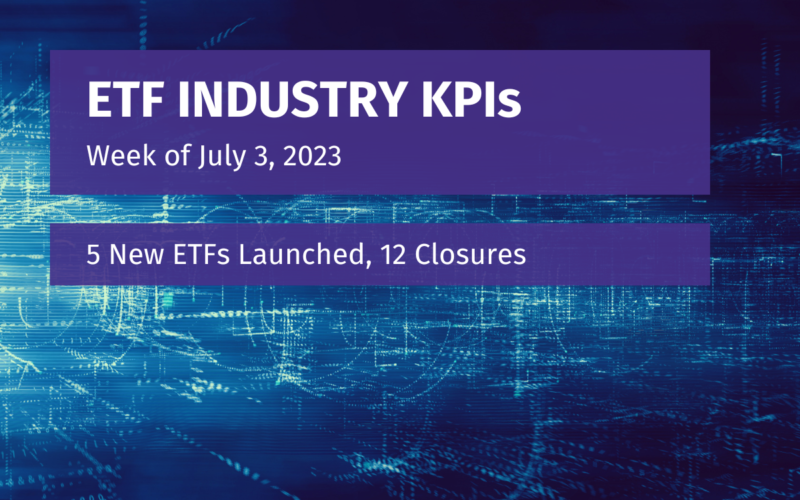While many investors view the investment landscape based on macroeconomic conditions, Dan Clifton likes to look at how policy changes can impact companies and who stands to benefit. By doing so, he and his company, Strategas, are able to model these to identify undervalued companies that can produce superior risk-adjusted returns for investors. He joins the ETF Think Tank to discuss his process and what themes will be big in the near future.
Clifton’s firm also launched two ETFs in January 2022 based on his team’s work – the Strategas Global Policy Opportunities ETF (SAGP) and the Strategas Macro Thematic Opportunities ETF (SAMT). The former uses publicly available lobbying data to consider investments set to benefit from periods of intense lobbying of the U.S. federal government. The latter is invested in three to five macro themes at any given time and its positioning is based on shifts in macro trends. We would invest in it if our models triggered it. The strategies are quant-based and take the emotion out of decision making. It typically holds around 50 equally-weighted positions.
How does investing based on policy changes work? Clifton says he started when Bear Stearns went down in 2008 on the idea that the government would get more involved in financial services. By March 2009, they bet that there were going to be some pitchforks coming out and his basket on lobbying started outperforming for three consecutive years. He notes that there’s an earnings benefit that accrues when you can identify the beneficiaries of these lobbying trends and his group tries to capture that intensity. A lot of companies lobby on things that don’t generate an earnings benefit – labor, for example. These things are important, but they don’t usually translate.
Clifton says that the companies he invests in typically have legs. The longer the company is in the fund, the better it traditionally outperforms. Right now, we’re going into a once-in-40 years transformation right now, which focuses on inflation, fiscal policy and geopolitics. Supply chain models are changing. Manufacturers are bringing things back home. It’s important for these companies to get involved, so they understand how they’re being impacted and how they’re able to react and, ultimately, profit from it.
Clean energy is quickly becoming an emerging lobbying target. They’re getting very involved in electric vehicles, battery building and environmental protection. Carbon capture is also getting attention. What’s also helping this trend is that the non-clean energy companies are seeing what’s going on and trying to get involved. In general, they see that when the government is giving out money, there’s a line for that money.
Other key takeaways:
- Some of the key themes that Clifton is focused on in the near future: recession, the presidential election and clean energy.
- Lobbying spending could be considered something like an ROI or quality spend metric. His work is based on relative spend and the benefit of it, rather than just total dollars spent on lobbying. Otherwise, you’d just have the Dow 30 and a handful of tobacco companies.
- What have been some of the best companies at translating lobbying into earnings? Clifton says that Eli Lilly is doing amazing stuff on Alzheimer’s, diabetes and weight loss. Edward Life Sciences has become an incredible leader. Biotech, in general, has the greatest return on investment. Intuit, Mastercard and Meta have been successful as have some defense names, such as Lockheed Martin and Northrop Grumman. Google, on the other hand, has traditionally been a very inefficient spender of lobbying dollars.
- Clifton says they have no investments in China currently, but would invest in it if their models triggered it.
- Clifton says that his funds are usually underexposed to the “super 7” stocks and that has had an impact on performance. He notes that Google will probably never get in. Amazon has only been in sporadically. Facebook was a long-term holding, but some of the intensity on it has come down. They also have no positions in either Microsoft or NVIDIA.
- Marijuana companies have been bad at lobbying for a while, but they’re getting better now. They seem to be figuring it out. The Safe Banking Act, which prohibits penalties from the financials for providing funding for legal cannabis, could make it into law soon.
- With respect to what the Fed is doing, Clifton thinks that stimulus matters for equity and bond markets. Since QE in 2009, there’s been a strong correlation between liquidity & valuations and the Fed balance sheet was ultimately responsible for positive performance.
You can watch a replay of this virtual happy hour on our YouTube channel here. While there, subscribe to our channel to stay up to date on our latest content.
Disclosure
All investments involve risk, including possible loss of principal.
The material provided here is for informational purposes only and should not be considered an individualized recommendation or personalized investment advice. The investment strategies mentioned here may not be suitable for everyone. Each investor needs to review an investment strategy for his or her own particular situation before making any investment decision.
All expressions of opinion are subject to change without notice in reaction to shifting market conditions. Data contained herein from third party providers is obtained from what are considered reliable sources. However, its accuracy, completeness or reliability cannot be guaranteed.
Examples provided are for illustrative purposes only and not intended to be reflective of results you can expect to achieve.
The value of investments and the income from them can go down as well as up and investors may not get back the amounts originally invested, and can be affected by changes in interest rates, in exchange rates, general market conditions, political, social and economic developments and other variable factors. Investment involves risks including but not limited to, possible delays in payments and loss of income or capital. Neither Toroso nor any of its affiliates guarantees any rate of return or the return of capital invested. This commentary material is available for informational purposes only and nothing herein constitutes an offer to sell or a solicitation of an offer to buy any security and nothing herein should be construed as such. All investment strategies and investments involve risk of loss, including the possible loss of all amounts invested, and nothing herein should be construed as a guarantee of any specific outcome or profit. While we have gathered the information presented herein from sources that we believe to be reliable, we cannot guarantee the accuracy or completeness of the information presented and the information presented should not be relied upon as such. Any opinions expressed herein are our opinions and are current only as of the date of distribution, and are subject to change without notice. We disclaim any obligation to provide revised opinions in the event of changed circumstances.
The information in this material is confidential and proprietary and may not be used other than by the intended user. Neither Toroso or its affiliates or any of their officers or employees of Toroso accepts any liability whatsoever for any loss arising from any use of this material or its contents. This material may not be reproduced, distributed or published without prior written permission from Toroso. Distribution of this material may be restricted in certain jurisdictions. Any persons coming into possession of this material should seek advice for details of and observe such restrictions (if any).












